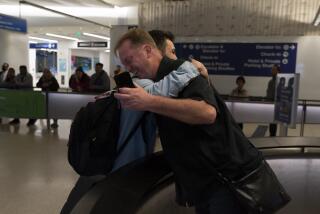Man Convicted of Assisting Terrorist Group
- Share via
A San Fernando Valley man has become the first person convicted under a federal law making it a crime to provide material support to State Department-designated terrorist groups.
Bahram Tabatabai, 43, who operated out of offices in Encino, was accused of providing phony immigration documents to members of the Mujahedeen Khalq, or MEK, a group engaged in a long-running campaign against Iran’s rulers.
The organization has waged an unsuccessful battle to be dropped from the State Department’s list of 30 international terrorist groups.
Founded by university students, the Mujahedeen Khalq helped topple the Shah of Iran in 1979, but ran afoul of the clerics who took control afterward. A statement signed last year by 220 members of Congress from both parties said the organization was a legitimate resistance movement and should not be on the list. But a federal court judge in Washington recently upheld the designation.
On Monday, Tabatabai, of Sherman Oaks, pleaded guilty to violating the 1996 anti-terrorist law. Prosecutors said it was the first conviction under the statute.
His guilty plea, which carries a maximum penalty of 10 years in prison, was part of a written plea agreement that was ordered sealed by U.S. District Court Judge Christina A. Snyder--a move that indicated that Tabatabai may be cooperating with authorities.
Tabatabai, who is being held without bail, also pleaded guilty to a conspiracy charge punishable by up to five years behind bars.
He was one of 11 people indicted by a Los Angeles federal grand jury last March as alleged members of an immigration fraud ring catering to Iranian nationals.
Assistant U.S. Atty. Kenneth White described Tabatabai as the ringleader. Records seized from his Encino offices indicated that he had “hundreds” of clients who were provided with fabricated documents, the prosecutor said.
The illegal immigrants, including some alleged MEK members, were given fake birth certificates, bank and employment records, school transcripts, wedding announcements and letters from nonexistent relatives so they could obtain visas or apply for political asylum, according to the indictment.
Once the bogus documents were prepared, the immigrants would travel to Nicosia, Cyprus, where they submitted applications at the U.S. Embassy with the help of an alleged ring member based there.
For clients already in the United States who wished to remain, Tabatabai would file political asylum applications containing fictitious accounts of persecution.
Tabatabai, a naturalized U.S. citizen born in Iran, often appeared with them at their asylum hearings, translating Persian to English. A government affidavit said he would sometimes change an applicant’s answer in translation to avoid possible slip-ups.
Government records show that he attended more than 300 hearings at the INS political asylum office in Anaheim.
Tabatabai was said to have offered two levels of service. One cost $2,500 to $3,000 and consisted of coaching an applicant on how to obtain a U.S. visa. A more expensive hands-on service, which cost $8,000 to $12,000, included a guarantee of receiving a visa. Fees for political asylum applicants ran higher.
Federal officials launched an investigation into his operation in 1996, after an unnamed employee approached the FBI.
With the informant’s help, investigators from the FBI, the INS and the State Department’s Diplomatic Security Service monitored and recorded Tabatabai’s conversations with clients, including some who acknowledged being associated with Mujahedeen Khalq.
Tabatabai is scheduled to be sentenced by Snyder on Feb. 14.
Two other defendants have previously pleaded guilty.
Tabasom Gabaizadeh, 23, of Beverly Hills, pleaded guilty in June to one count of submitting false statements to the INS. A former employee of Tabatabai, he is to be sentenced next month. Amir Hossein Haghighatgoo, 44, of Encino, pleaded guilty in August to providing false documents and is scheduled to be sentenced in January.
Still facing charges are Raffi Tamtami of Nicosia, who is wanted by U.S. authorities; Soraya Karimian, 42, of Glendale; Mersedeh Mohabber, 25, of Los Angeles; and Patricia Ann Rees, 45, of Reseda, all Tabatabai employees. Also facing charges are Mohsen Arefe, 42, and his wife, Mashid, 43, who operated a printing business that allegedly produced faked documents.
Reza Veiseh, of Woodland Hills, and Shahbod Noori, about 35, editor of Tehran International Weekly Magazine, both also are accused of producing false documents.
More to Read
Sign up for Essential California
The most important California stories and recommendations in your inbox every morning.
You may occasionally receive promotional content from the Los Angeles Times.













